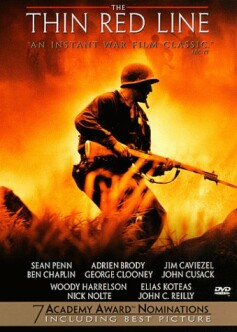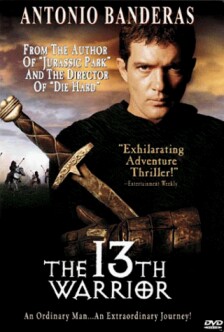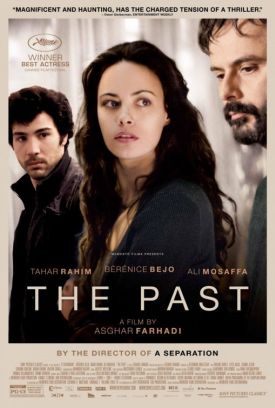Thin Red Line, The
The Thin Red Line, adapted from James Jones’s novel of Guadalcanal by
the “legendary” Terrence Malick, director of Badlands and Days of
Heaven, represents an “historic” return to movies for its director after a
20 year layoff. It is a mess — a classic case of what happens when you work
on something for too long. Yet Malick probably would have made a mess of this
movie even if he had made it with more dispatch, since he begins from the
premiss that World War II-era soldiers thought like Vietnam era
protestors — that is to say, he shows them as constantly agonizing about the
war and their role in it and belonging emphatically not among the citizen
soldiers who actually won the war but to the post-60s aristocracy of feeling
which may yet make the winning of any wars in the future impossible.
For all the film’s vaporing about metaphysics and belief there is not so much
as a mention of any traditional religion. These are 60s kids, cut adrift from
traditional faith and spending far too much time examining their own feelings.
Even the tough Sgt Welsh (Sean Penn) concludes that a man should “find something
that’s his and make an island for himself.” Malick seems to take all the
philosophizing about war out of the novel’s narrative voice and put it in the
mouths of ordinary soldiers, from whom it just sounds ridiculous. Thus he has
one soldier telling another that it’s all “a matter of luck” who lives and dies
once the bullets start flying. “If you’re in the wrong spot at the wrong time,
you’re going to get it.” That might be something that an audience of civilians
needs to be told, like “Do you imagine your sufferings will be less because you
loved goodness and truth?” But soldiers already know it.
He also manages to leave out one of the most important elements of war, the
black comedy. These soldiers never laugh, even when Sergeant Keck (Woody
Harrelson) forgets that he has pulled the pin of a grenade, stands up with just
the pin in his hand, desperately tries to retrieve it, then cries, after the
inevitable explosion, “I blew my butt off!” Or when the obviously psycho McCron
wanders about the battlefield muttering to himself. These are both supposed to
be only pathetic cases, not funny as they would also have been to men inured to
the sight of death and mutilation. Instead, these are sensitive, post-feminist
men, constantly grimacing and contorting their features into masks of pain and
deep feeling. Sergeant Welsh talks regretfully about being emotionally “frozen
up” while the sensitive free spirit, Private Witt (James Caviezel), says to him,
“You care about me, don’t you Sarge?. . .Why do you always make yourself out
like a rock?. . .”
In real life he might just have got “care about me” out of his mouth before
getting his teeth knocked down his throat, but here it is just one of many long,
lingering moments on camera as one soldier gazes feelingly into another’s eyes
or lugubrious voiceovers and solemn music explore What It’s All About. “Where
was it that we were together. Who were you that I walked with, the brother, the
friend?” True, it is an exercise in humanizing war — or perhaps animalizing
it, given the large numbers of exotic tropical fauna, including crocodiles,
parrots, buzzards, lizards, bats, and wild dogs, featured in between battle
scenes. But war has been humanized so many times by now that it seems we are in
danger of forgetting some of its inhuman glories.
Mass killing is just not inherently tragic, however hard someone like Malick
tries to make it look so with his grimacing actors and orchestral crescendos and
portentous voiceovers about where war — or love or death or name your own
mystery — comes from. Our emotional centers are just not capacious enough to
take it in. Death, even cinematic death, can only really make an impact on us
locally, by ones and twos, among those we have already taught ourselves to care
about. From anything more than that, or more anonymous than that (and the
characters in this film are pretty anonymous; few are even known by name except
in the credits) we must detach ourselves, as soldiers in battle must, in order
to continue to function, and part of that detachment is accomplished by
humor.
There are also some serious anachronisms, the worst of which has Colonel Tall
(Nick Nolte) proclaiming openly to men under his command that the reason he is
ordering them to undertake a very dangerous mission, and without the certainty
of having enough water, is that “I’ve waited all my life for this; I’ve worked,
I’ve slaved, I’ve eaten untold buckets of s*** to get this opportunity, and I’m
not passing it up now!” Then he says to Capt Staros (Elias Koteas), “You don’t
know what it’s like to be passed over. . .” It’s not that no U.S. Army colonel
ever thought such a thing, but I seriously doubt that any has ever been so
totally lacking in self-protective instincts (to say nothing of tact and
feeling) as to have said it out loud under such circumstances. Having a senior
officer say, in effect, “You men are just going to have to risk your lives for
my career” is a mere travesty of military honor, and, like so much else in this
film, it bears the stamp of the fatally self-righteous 1960s.
Discover more from James Bowman
Subscribe to get the latest posts to your email.






